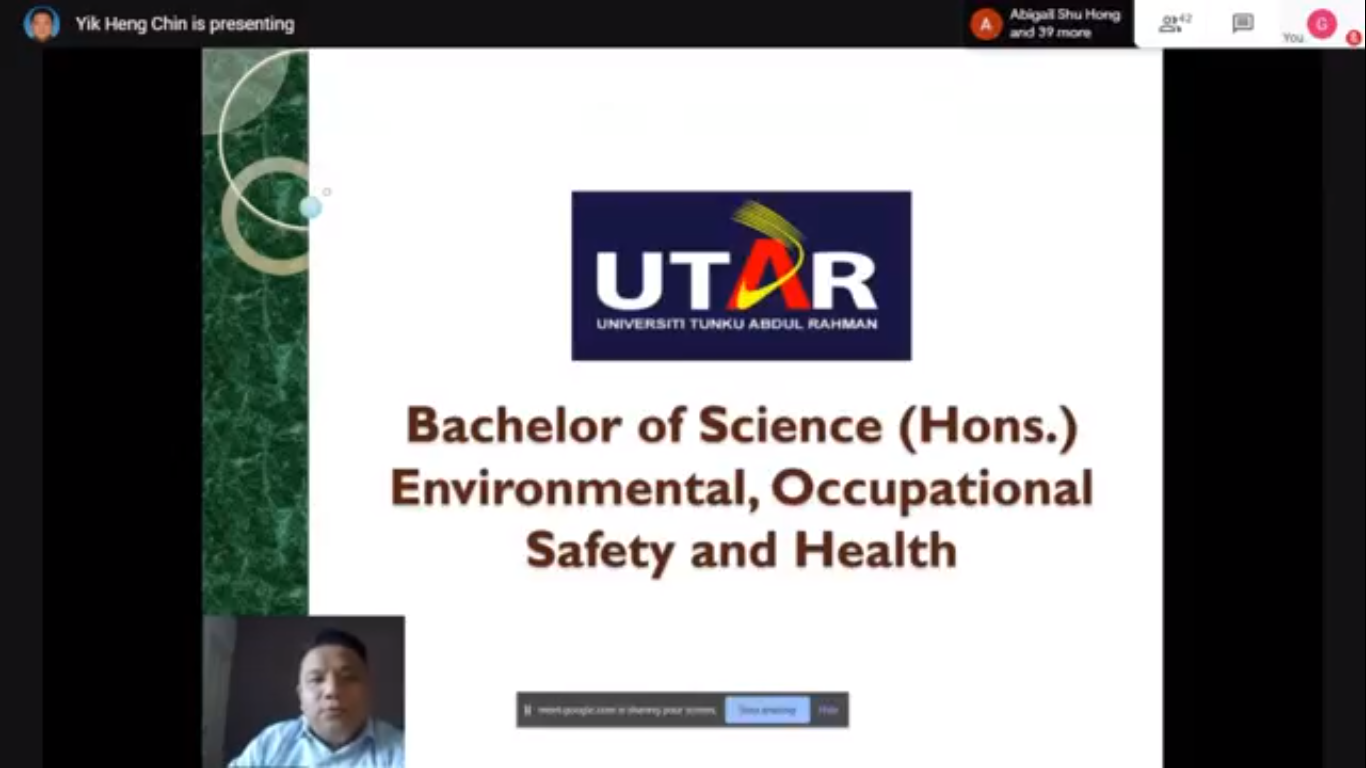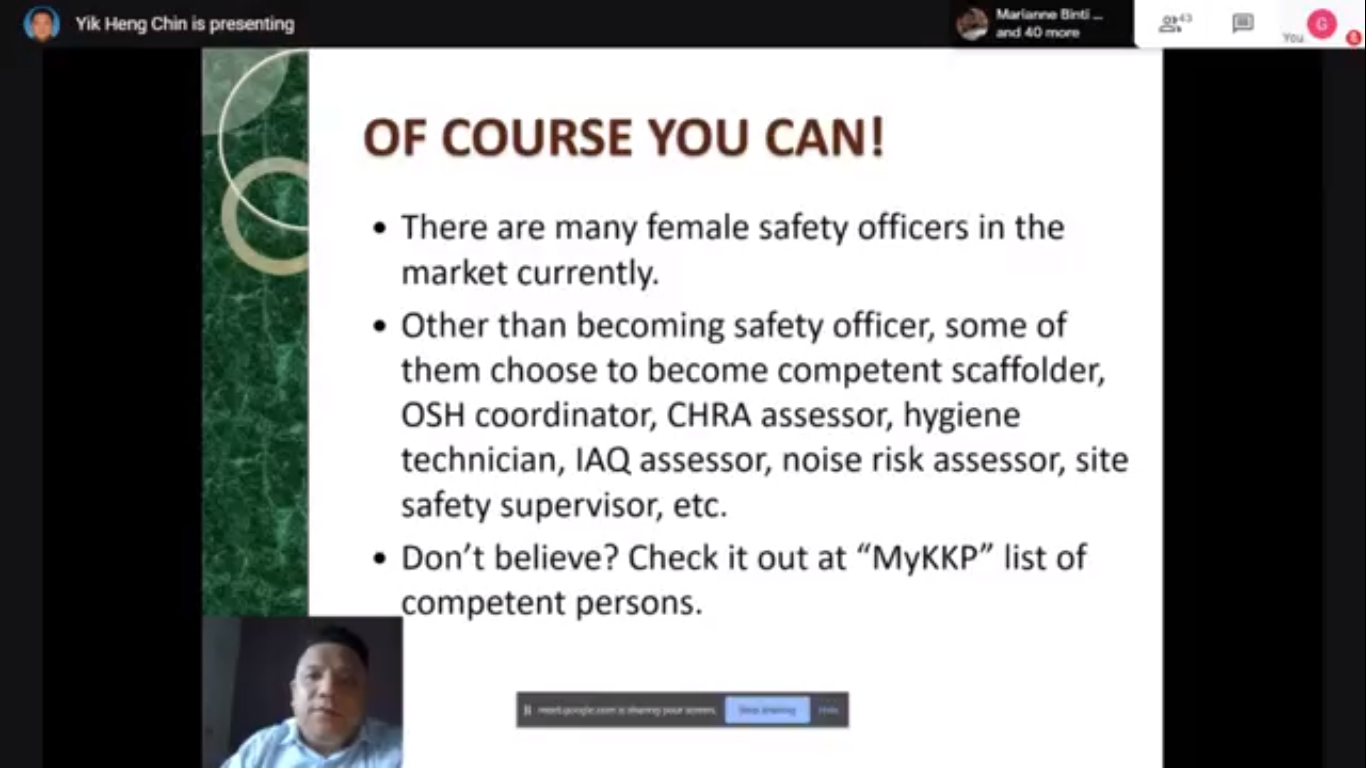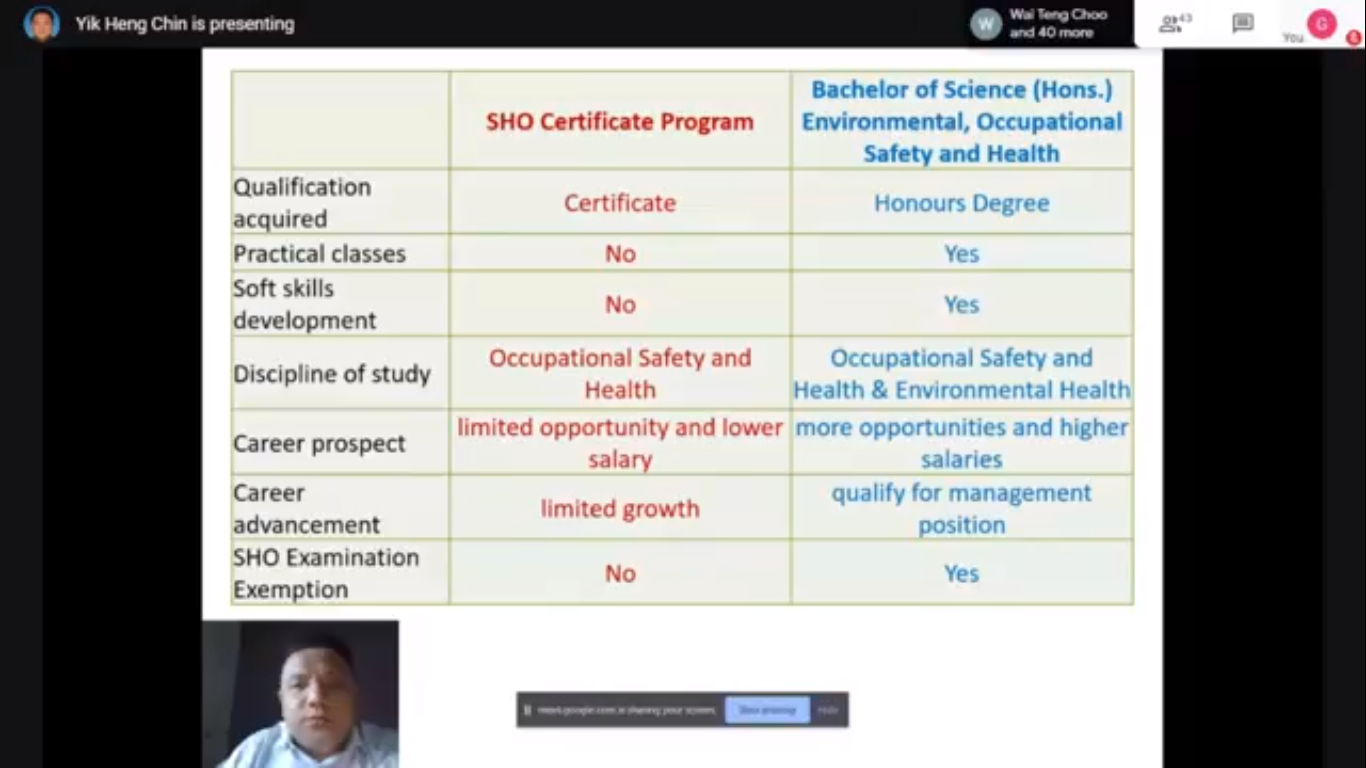
Unemployment among Malaysian is concentrated among the youths, as 5.8 out of 10 unemployed individuals are below the age of 34. To make matters worse, one out of five fresh graduates remain unemployed six months after graduation while 25% of the degree holders are jobless. With the aim to address the issue of unemployment in the job market and introduce a solution, the Kuala Lumpur Engineering Science Fair (KLESF) and UTAR Faculty of Engineering and Green Technology (FEGT) held a webinar titled “Environmental, Occupational Safety and Health” on 27 August 2020 via Google Meet. The speaker was FEGT academic Ts Chin Yik Heng. The session was moderated by FEGT academic Ts Dr Leong Kah Hon.

Dr Leong introducing Ts Chin to the participants
Ts Chin started the talk by highlighting that degree holders remain
unemployed due to mismatch in skills, low pick-up rate on science,
technology, engineering and mathematics (STEM), low participation in
technical and vocational education and training (TVET), job search and
recruitment and lack of entrepreneurial skills. He also brought up the fact
that most graduates lack relevant work experience.
“It is very important to understand what the employers want,” Ts Chin
emphasised as this projects what the future job market requires. Through
this, students are able to better prepare themselves for when they start
working. Based on his research, he found that employers look for students
who possess problem-solving skills, communication skills, independence, the
willingness to learn and the ability to work under pressure.
According to Ts Chin, academic institutions fail to meet industry
expectations because there is a mismatch between the university’s curriculum
and the industry's needs. “This is where fresh graduates lack the necessary
working experience and soft skills to be employed as it was not taught in
the university,” he said and brought up a quote by Albert Einstein, “The
only source of knowledge is experience.”
Ts Chin then explained four ways to address this issue, “Firstly
universities need to incorporate soft skills development into their
programme. Universities should also have extensive internships to expose
students to various industries and have more practical/simulation classes to
give students more hands-on experience. Lastly, the university should ensure
that students obtain knowledge transferred from industry experts.”
With that, Ts Chin introduced UTAR’s new degree programme, the Bachelor of
Science (Hons) Environmental, Occupational Safety and Health. “This
programme has been specifically designed to fulfil the industry's needs,” he
said. The programme is MQA accredited (MQA/ PA 8677) as it was developed
based on the MQA Programme Standards for Medical and Health Sciences. The
programme structure consists of 131 credit hours and is four years long,
where one year will be spent in the industry for internships.

Ts Chin introducing Bachelor of Science (Hons) Environmental, Occupational
Safety and Health
This is a double major programme as it integrates both ‘environmental
health’ and ‘occupational safety and health’ disciplines within the same
programme. Ts Chin said that this was done after gathering feedback from
employers during a market survey. An organisation would typically only hire
an Environmental Health and Safety (ESH) engineer or Safety Health and
Environmental (SHE) engineer to handle both environmental and safety and
health matters. By graduating with this degree, students will be well
equipped with the skills needed to meet the market needs. “This double major
programme will also provide graduates with sufficient knowledge and skills
to multitask,” Ts Chin added.
The degree programme offers a very comprehensive curriculum based on the
needs of employers. Courses to enhance students' soft skills, like
communication and leadership, are also included. For instance, subjects like
English for Professional Communication, Industrial Psychology and
co-curricular are in the programme structure for the betterment of students'
soft skills. Most of the subjects also require group assignments and
presentations. In that way, students will be encouraged to practise soft
skills like leadership and communication skills.
The programme will also require students to undergo industrial training
three times with specific placements at clinical setups, government agencies
and private sectors. “We are doing this to ensure students meet the industry
expectations,” he explained.
Ts Chin also highlighted that teaching staff in the programme are competent
as they come with an intensive background from the industry. An external
certified industrial hygienist will also be invited to teach during the
practical classes. “This is the best way of transferring knowledge from the
subject matter expert to our students,” Ts Chin emphasised.
Moving on, Ts Chin answered some frequently asked questions since launching
the Bachelor of Science (Hons) Environmental, Occupational Safety and Health
(EOSH). Currently, there is a demand for occupational safety and health
officers as environmental and safety and health issues are everywhere. There
are also other careers one can opt for with the EOSH degree, besides being a
safety and health officer, like an indoor air quality assessor or a major
hazard competent person. One can also opt for working in the environmental
safety side as a schedule waste manager or professional in scrubber
operation. Ts Chin also said that females can venture into the industry as
well.

Ts Chin explaining to participants that females can also work in the
industry
While comparing the EOSH honours degree to the National Institute for
Occupational Safety and Health (NIOSH) Safety and Health Officer (SHO)
certification course, Ts Chin said, “The degree will provide students with
the opportunity to practice in the practical classes and during the
extensive industrial training as well as developing their soft skills. Not
only that, students that take the degree will have more career
opportunities, higher salaries and the qualification for management
positions when compared to the certification course. Students that take the
degree will also be exempted from the Safety and Health Officer
examination.”
The session ended with a Q&A session.


Wholly owned by UTAR Education Foundation Co. No. 578227-M LEGAL STATEMENT TERM OF USAGE PRIVACY NOTICE